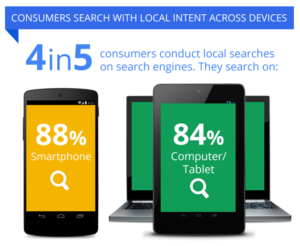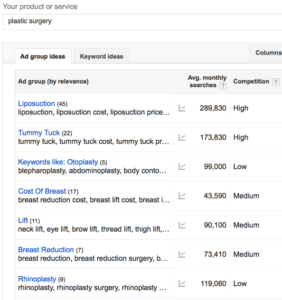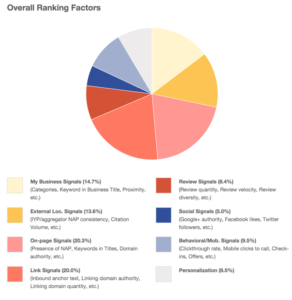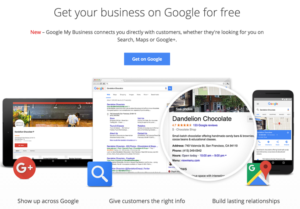A personal recommendation from a friend or family carries far more weight than an ad on a billboard. Because it comes from someone you know and trust. So you are much more likely to try out the product or service especially if it received a glowing testimonial.
If you are a plastic surgeon then you know how important referrals are. Your existing customers are an excellent source as they can spread the word about your practice. Another is search as visibility in the search results can drive even more referrals.
And it can be incredibly lucrative.
A survey from Google found that 4 out of 5 consumers use search engines to find information about local businesses from store directions to operating hours and customer reviews.
But if your practice is not ranking, your target audience won’t be able to find your practice online. Competition in the search results is extremely competitive so ranking for your target keywords is no easy task. After all, other plastic surgery practices are likely vying for the very same keywords. You don’t want to simply throw in the towel either as it would mean losing potential customers.
This is where search engine optimization comes in.
SEO is the process of improving your site rankings in the search results for target keywords that are relevant to the products or services you offer. Examples of what SEO is done to a website include:
- Creating and optimizing content for your target keywords
- Building relevant links to increase authority
- Improving site structure and loading times
- Making your site mobile-friendly
These efforts all come together to help your site rank for your target keywords. The return on investment can be incredibly high especially when traffic turns into leads and sales for your practice. Here we look at the steps to help your practice get started on the right path.
1. Target the Right Keywords
It all starts with targeting the right keywords.
Google’s Keyword Planner is an excellent tool to find additional keywords and get traffic estimates. Simply enter keywords that are relevant to your practice and click on the Get Ideas button. Here is an example for the keyword “plastic surgery”:
One mistake that we see small businesses make is going too broad.
Keywords such as “plastic surgery” and “liposuction” are incredibly competitive. Ranking for them can easily take years of effort (no guarantees though) and cost a significant amount. These types of keywords aren’t very targeted either as the searcher could be doing research for a project or researching career options.
A better approach is to target long tail keywords. Examples include:
- Cosmetic plastic surgeons in Westlake
- Liposuction surgery in Rollingwood
These are the types of keywords your practice should be targeting to reach local prospects as they tend to be much more targeted and less competitive.
2. Optimize On-Page Factors
On-page factors are elements of your pages that affect their visibility in the search results.
A survey from Moz found that on-page signals carry a great deal of weight in terms of local SEO:
Optimizing on-page signals won’t guarantee overnight rankings but doing so definitely puts your site ahead of the competition. Here are the areas to focus on:
- Title tags: Titles are the first thing that users see when conducting a search. The title for your pages should include your target keywords and be written to entice users to click through. But remember to keep it within 70 characters so it doesn’t get truncated.
- Meta descriptions: These are the short snippets of text that appear under the title. Use your target keywords here as well as a short call to action to increase click through rates.
- Header tag: Headings improve readability and the relevance of your content. Here we suggest using secondary keywords (or synonyms) to help your pages rank for other keywords.
- Content: Visitors click through to pages for information. Optimize your pages for their target keywords but remember to write for your audience. For landing pages, provide accurate and detailed information for your visitors. But remember not to over-optimize your content as doing so could result in a ranking penalty.
Another important consideration is your business information.
NAP refers to Name, Address, and Phone Number. This information is absolutely critical to rank in the local search results so be sure to include these details on your pages and make sure everything is accurate.
3. Build Local Citations
Citations are references to your business name and address on other sites.
These are a key component of ranking in the local search results. Google considers the number (and quality) of citations to your site to evaluate the authority of your business. All other factors being equal, businesses with more citations will rank higher than those without any.
Two of the most important factors are:
- Consistency: For citations to help with your local SEO marketing strategy, citations need to be consistent. This means that the NAP on your site should match details about your business on other sites. So choose one format and stick with it when creating profiles.
- Relevance: Relevance matters a great. A citation from a plastic surgery board will carry far more weight than a reference on a completely irrelevant forum. Quantity is not always the best approach. Focus your efforts on obtaining citations from relevant sources.
One of the most valuable citations is Google My Business.
Google My Business helps improve your site visibility across Google including Google+ and Maps. Create a profile for your plastic surgery practice and take steps to optimize your listing. Double check that all the information is accurate and exactly how you want it to appear online.
Conclusion
SEO increases visibility of your practice in the search results.
It requires careful planning and strategic implementation. But if done right, it offers an excellent return on investment in the form of quality leads to your practice. Following the steps as outlined here will help give your site a strong competitive advantage online as most sites ignore even the most basic SEO strategies.




